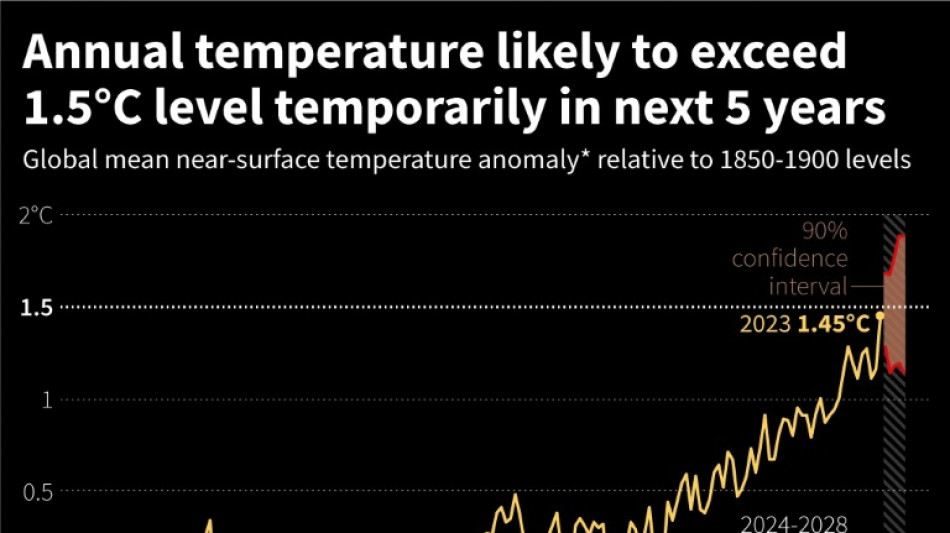
RBGPF
-0.9400

Humanity now faces an 80 percent chance that Earth's temperatures will at least temporarily exceed the key 1.5-degree Celsius mark during the next five years, the UN predicted Wednesday.
The 2015 Paris climate accords, which set the ambitious target of limiting the world to a temperature increase of 1.5 C over pre-industrial levels, meant to refer "to long-term temperature increases over decades, not over one to five years", the UN's World Meteorological Organization said.
The report came alongside another by the EU's Copernicus Climate Change Service announcing that last month was the hottest May on record, pointing to human-induced climate change -- and spurring UN chief Antonio Guterres to compare humanity's impact on the world to "the meteor that wiped out the dinosaurs".
The chance of temporarily exceeding the limit in the next five years ahead has been rising steadily since 2015, when such a chance was estimated to be close to zero, the UN's weather and climate agency noted.
"There is an 80 percent likelihood that the annual average global temperature will temporarily exceed 1.5C above pre-industrial levels for at least one of the next five years," WMO said.
In 2023, the risk of temporarily breaching the limit within five years was estimated at 66 percent.
Already, dramatic climate shifts have begun taking a heavy toll worldwide, fuelling extreme weather events, flooding and drought, while glaciers are rapidly melting away and sea levels are rising.
- 'Record-breaking' path -
"We are on a record-breaking warming path," WMO deputy chief Ko Barrett told reporters in Geneva.
"WMO is sounding the alarm that we will be exceeding the 1.5 C level on a temporary basis with increasing frequency."
She added that "we have already temporarily surpassed this level for individual months".
Barrett noted though that temporary breaches "do not mean that the 1.5 C goal is permanently lost because this refers to long-term warming over decades".
"But the trend is alarming and cannot be denied."
Temperature levels are rising, with 2023 by far the hottest year on record, amid warnings that 2024 could be even hotter.
Currently, the WMO predicts that the mean near-surface temperature for each year between 2024 and 2028 will be 1.1-1.9 C above the pre-industrial levels recorded between 1850 and 1900.
- 'Way off track' -
Pointing to repeated monthly temperature records over the past year, the WMO highlighted that already the past 12 months, from June 2023 to May 2024, were "the highest on record".
And it said there was now an 86-percent chance that one of the years between 2024 and 2028 would unseat 2023 as the annual record-holder.
It also said there was a 90-percent likelihood that the mean temperature for 2024-2028 would be higher than that over the past five-year period.
"We are way off track to meet the goals set in the Paris Agreement," Barrett said.
V.Munir--DT